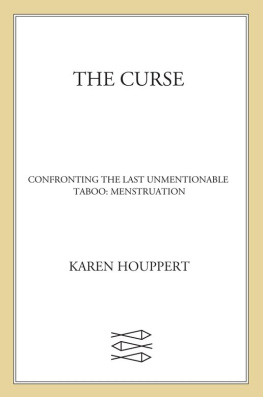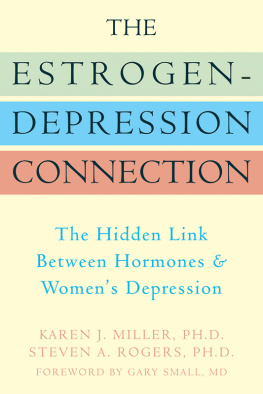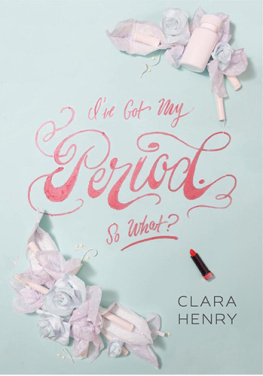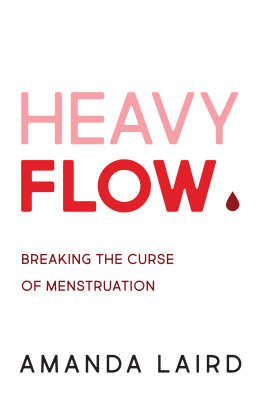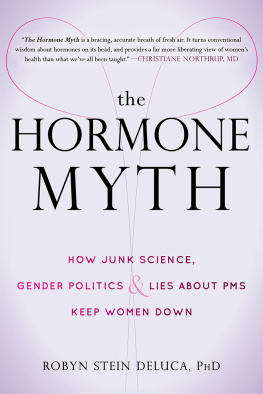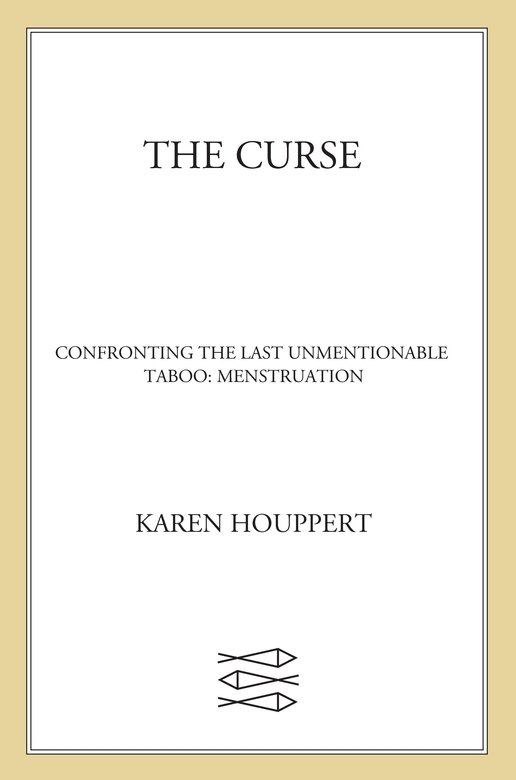I would like to thank the following people for their help with this book: Elisabeth Kallick Dyssegaard, for her confidence in this project and for gently shepherding me from indignation to analysis; Amy Virshup, for her predictably insightful and thorough comentary on sections of this book; Cindi Leive, for tipping me off about the period stories in teen magazines and for her meticulous reading of various chapters; Eva Lewandowski, for letting me interview her campers; Lisa Kennedy and Karen Durbin, for enthusiastically editing my first investigation into the sanitary protection industry; my feminist reading groupLucia Russett, Sandy Opatow, Katherine Pushkar, Cindi Leive, and Karen Cookfor exploring so many of these ideas with me; Sue Breton, for her intellectual and concrete contributions; Sandra Dijkstra, my agent, for never batting an eye at this peculiar book proposal and for peddling it with similar aplomb; Sharon Golub, for suggesting sources and for her inspirational years of work researching this neglected topic; Joe Cummins and Jenny Douglas, for their incisive editorial suggestions; Pat Houppert, for her intellectual support (reading and commenting on various drafts), her financial support (the occasional artists grants), and her practical support (servingas baby-sitting pinch hitter extraordinaire); Abby Kagan and Elaine Blair, for their valued contributions to the final product; Darla Batistic, for tossing around some of these thoughts with me for the past twenty years; and Stephen Nunns, my reluctant yet trenchant and indispensable critic.
T wenty years after writing out my theorems and postulates in a small blue Mead memo notebook, I feel a little as if I am rehashing the same issuesthis time in a big red notebook called The Curse . I am still hoping that if I arrange and itemize things with the if-then logic of geometry, my lines of inquiry will resolve themselves into tidy, irrefutable corners. But my theorems and postulates read like riddles rather than revelations. Menstruation is taught in schools because its natural, but treated as though its nasty. Menstruation is normal, but the attendant hormonal flux is a disease. Menstruation is obsessively hidden, yet its real disappearancemenopauseengenders disdain. Menstruation doesnt really have anything to do with sexuality, yet it shares all its taboos.
After spending almost two years doing nothing but reading and thinking about periods, I continue to find menstrual etiquette perplexing. Why has this elaborate system of subterfuge evolvedand, more important, endured? The answers I come up with are vague and amorphous. It is easier to say what I dont think.
I dont think its a conspiracy generated by a small coven of advertising and industry executivesthough I think theyvecapitalized on and exploited our phobias. I dont think euphemisms like the curse have evolved simply because bleeding is inconvenient and we get cramps. And I dont think tradition or religious doctrine accounts entirely for our behavior (at least, I dont think it is the interesting part of the answer, the bit that gets us closer to understanding why we continue to respect these customs).
On the other hand, I do think our menstrual etiquette persists because it shores up a slew of problematic beliefs about women and reproduction, sex, sexuality, and power. Menstruation belongs in the swelling heap of feminist thought, the pile labeled Womens Bodies Are a Battleground, as it is yet another example of our cultures troubling propensity to project a host of anxieties onto womens bodies. These projections are debilitating because they distort our reality. They color our perceptions and inform our behavior.
In the course of writing this book, Ive become aware of the way I self-censor conversations about my work. When women ask me what Im up to these days, I tell them Im working on a book about menstruation and the culture of concealment surrounding it. I chat on about the advertising, the sex-ed tracts, the teen magazines, toxic shock and dioxin. When men ask me the same question, I tell them Im writing a book. If they pursue the matter, I tell them that Im working on a book about menstruation never periods, because menstruation at least sounds slightly clinical and scientific and weighty. I talk to them about the sanitary protection industry and dioxin and TSS for the same reasons. I assume that health issues lend credence to what might otherwise be dismissed as frivolous. I shyaway from, or rush through, the rest of my thesis, believing that these men would find it uninterestingor worse, embarrassingto discuss. Sometimes I catch myselfHow can you be writing a book about the hush surrounding menstruation and then perpetuate it?and make myself frankly describe my book. But the act requires a conscious effort.
I have puzzled over this behavior. Why do I act this way? And what difference does it make?
The why comes easier. I do this because I am hyperaware of periods as a girl thing. To talk openly with men about bleeding seems strange. Doing so makes me feel weird. Despite the fact that a quarter of us women in our reproductive years are menstruating at any given time, it feels abnormal to acknowledge this to men.
What difference does my reticencequite typical, I believemake? It matters because as long as not menstruating is perceived as the normand why else would we hide it ?women will always be the Other. Hushing up the fact of menstruation facilitates the illusion that its not happening. Non-bleeding becomes a standard from which all others deviate. Women are left wondering what it is about this experience that renders it inappropriate for public discussion. Where is my reality? And how does the knowledge that our reality is inappropriate affect our faith in our perceptions and the sense of entitlement that comes from trusting that our experience is representative? How does living on the margins, as the Other, affect us?
After a while it becomes psychologically disorienting for women to look out at a world where their reality doesnt exist. Menstruation itself does not create this effect, but it dovetailsnicely with all the other images and myths about bodies, sexuality, and desire that women encounterideas that are more proscriptive than enlightening.
For example, feminists have frequently railed against the narrow sexual paradigms our culture offers up to womenMadonna (saint and mother) or Eve (slut and temptress). In a 1980 essay in Signs: Journal of Women in Culture and Society, feminist Elizabeth Janeway asserts that these masculine archetypes of female sexuality are attempts to manipulate womans vision of herself and that coming out of an alien understanding, as they do, they are never really satisfactory. Women are left wondering: How do we contort a whole range of feelings into these diametrical extremes? The stories we are fed dont mesh with our reality. And when we dont find ourselves reflected in the culture, we begin to doubt our observations. The consequences, though rarely articulated, are profound. Otherness, in its social aspect, sets women apart from mainstream ideals and norms of behavior, Janeway warns in her seminal essay.
And, when it comes to periods, women themselves may be loath to fight this attitude. Perhaps wed rather not think about periods, let alone talk about them. After all, bleeding, by reminding women of their bodies, becomes a particularly unsavory event, since most women are not very happy with their bodies. Our bodies rarely measure up to the ideal bodies we see in magazines and on TV. And again, if our reality doesnt exist or isnt reflected in any way, its not long before we begin to worry that theres something wrong with us, just as I began to worry that my take on menstruation was inconsequential, wrongheaded, or (worse) an affront to men.

